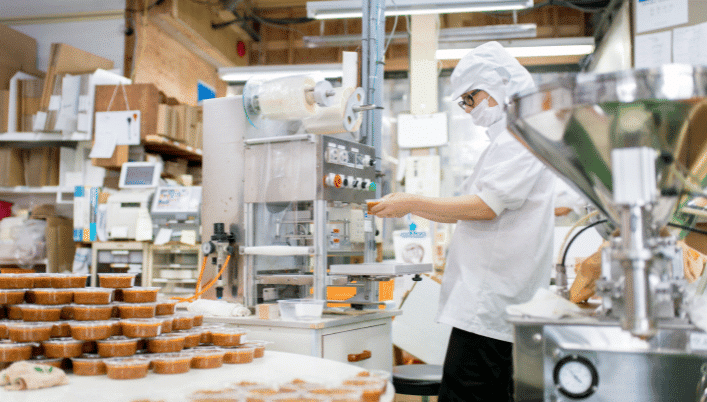
Step into the extraordinary realm of sustainable food factories, where innovation meets responsibility.
In a world shifting towards eco-consciousness, these factories have become pioneers in redefining food production.
Imagine a landscape where organic ingredients, renewable energy sources, and cutting-edge technology merge seamlessly to create a culinary revolution.
https://www.youtube.com/watch?v=AeQ0I1O4PhE
From traditional practices to sustainable paradigms, food factories have transformed.
Gone are the days of mere production; today, every process is an art form.
Witness the rise of automated wonders, where robots dance through kitchens, crafting delicacies with unparalleled precision.
These factories stand as beacons of quality and safety, ensuring that every bite is a testament to their commitment.
Key Takeaways
- Sustainable Food Production Methods: Food factories are adopting practices to minimize environmental impact by using organic ingredients, reducing water and energy consumption, and implementing waste management.
- Technology Advancements: Automation and robotics revolutionize food manufacturing, improving efficiency and product quality while reducing manual labor.
- Benefits of Sustainability: Sustainable practices reduce pollution, enhance brand reputation, save costs through efficient technologies, and align with consumer preferences.
- Singaporean Government Initiatives: Singapore’s Food Agency supports sustainable food production through grants, incentives, and hygiene audits, fostering a sustainable food manufacturing landscape.
- Global Recognition: Singapore is a key player in sustainable food production, known for stringent standards and innovation, expanding its reach to international markets.
- Success Stories in Sustainability: Examples like Woodlands Terrace highlight eco-friendly practices, renewable energy use, automation, and waste reduction for environmental and efficiency gains.
- Renewable Energy: Food factories can use solar panels for clean energy generation, reducing reliance on traditional sources and lowering carbon emissions.
- Automation and Robotics: Automation systems enhance efficiency, safety, and consistency in food production processes, reducing labor costs.
- Smart Production for Waste Reduction: Predictive analytics, quality control, and innovative methods minimize food waste in the production process.
- Energy-Efficient Building Design: Effective insulation, natural lighting, and HVAC systems in food factory designs promote energy efficiency and sustainability.
The Evolution of Food Factories: From Traditional to Sustainable Practices
Sustainable food production methods
There has been a growing emphasis on sustainable food production methods in recent years.
Food factories are now implementing practices that minimize the environmental impact of their operations.
This includes using organic and responsibly sourced ingredients, reducing water and energy consumption, and implementing waste management strategies.
Advancements in food factory technology
https://www.youtube.com/watch?v=qwGeio0wJ-w
The rise of technology has revolutionized the food manufacturing industry.
Automation and robotics have made production processes more efficient, reducing the need for manual labor and increasing productivity.
Additionally, using advanced machinery and equipment has improved food products’ overall quality and safety.
Benefits of sustainable practices in food factories
Implementing sustainable practices in food factories brings numerous benefits:
- It helps to reduce environmental pollution by minimizing resource consumption, waste generation, and carbon emissions.
- It enhances the reputation of food brands, as consumers are increasingly concerned about the sustainability of their products.
- Sustainable practices can also lead to cost savings in the long run, as energy-efficient technologies and waste-reduction strategies can lower operational expenses.
Embracing Sustainability: How Singaporean Food Factories Are Leading the Way

Government initiatives to promote sustainability in food factories
Singaporean food factories are at the forefront of embracing sustainable practices, thanks to the support of government initiatives.
The Singapore Food Agency (SFA) works closely with manufacturers to promote sustainable food production operations.
Various grants and incentives are provided to encourage the adoption of energy-efficient technologies, waste reduction practices, and renewable energy sources.
Additionally, the SFA conducts regular inspections and audits to ensure hygiene and safety standards compliance.
Singapore’s role in the global sustainable food industry
Singapore has emerged as a critical player in the global sustainable food industry supply chain.
The city-state is known for its stringent food safety regulations and high-quality standards.
Singaporean food factories have gained recognition for their innovation and commitment to sustainability.
Many local brands have successfully expanded their reach to international markets, showcasing the potential for sustainable food production on a global scale.
Success stories of sustainable food factories in Singapore
Several success stories of sustainable food factories in Singapore have set an example for the industry.
Woodlands Terrace, located in the heart of Woodlands Industrial Park, is one such facility that has adopted eco-friendly practices.
It utilizes renewable energy sources, implements automation and robotics in its production processes, and has implemented innovative techniques to reduce food waste.
These sustainable initiatives have reduced its environmental impact and increased overall efficiency and profitability.
Factory Innovations: Incorporating Sustainable Technology for Efficient Food Production
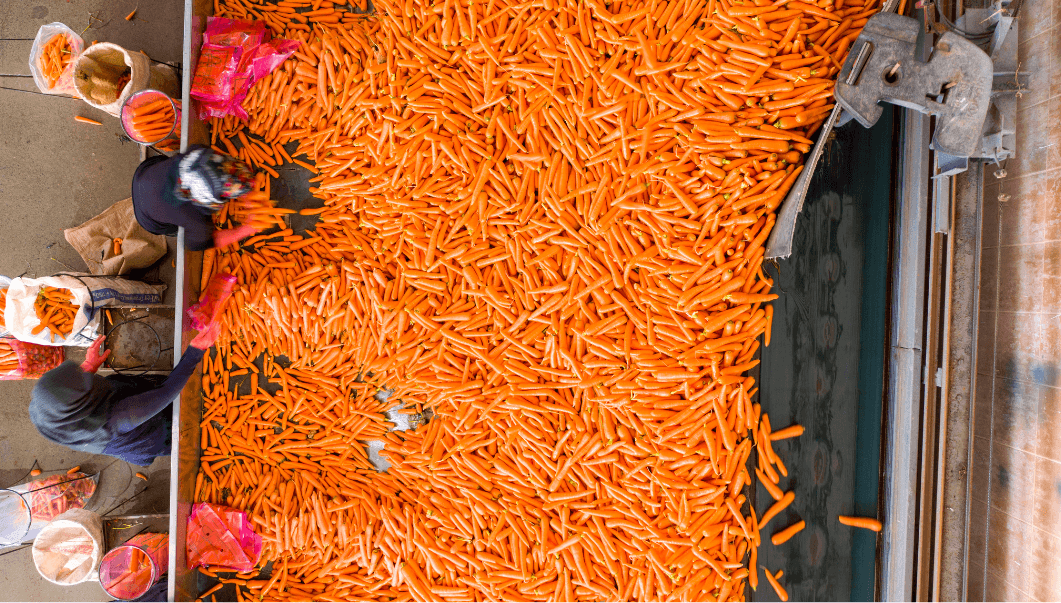
Use of renewable energy sources in food factories
One of the critical innovations in food factories is using renewable energy sources.
Solar panels, for example, can be installed on the roofs of factory buildings to generate clean energy.
This reduces reliance on traditional energy sources and helps to lower carbon emissions.
Implementation of automation and robotics in food production
Implementing automation and robotics in food production processes has revolutionized the industry.
Automated systems can perform repetitive tasks with precision and speed, increasing productivity and reducing labor costs.
Robotics can also enhance food safety by minimizing human contact and ensuring strict adherence to hygiene standards.
Reducing food waste through smart production techniques
Food waste is a significant issue in the food industry waste reduction.
To address this, food factories are adopting clever production techniques to minimize waste.
This includes using predictive analytics to optimize production schedules, implementing strict quality control measures to reduce product rejections, and finding innovative ways to repurpose or recycle food by-products.
Building a Greener Future: Sustainable Practices in Food Factory Design and Construction
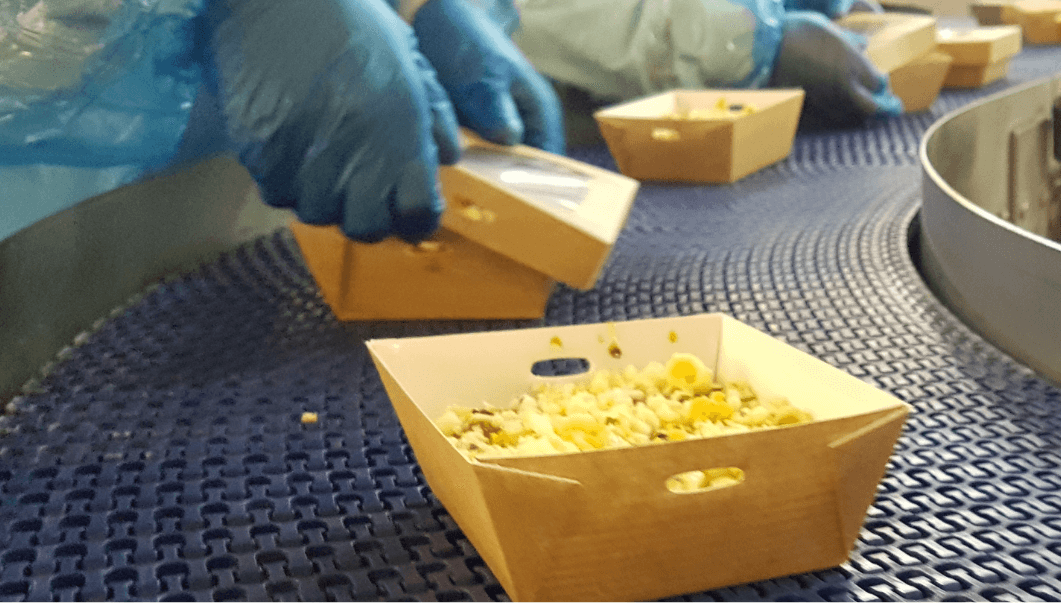
Energy-efficient building designs for food factories
Energy-efficient building designs can significantly contribute to the sustainability of food factories.
This includes incorporating effective insulation, utilizing natural lighting systems, and implementing efficient HVAC (heating, ventilation, and air conditioning) systems.
Green building certifications, such as the Green Mark scheme in Singapore, encourage adopting sustainable building practices.
Green materials and technologies in food factory construction
Green materials and technologies are becoming increasingly common in food factory construction.
For example, sustainable materials like recycled steel and eco-friendly insulation can be utilized.
Additionally, incorporating rainwater harvesting systems and gray water recycling helps to reduce water consumption in the facility.
Creating eco-friendly landscapes around food factory facilities
Food factories can also contribute to a greener future by creating eco-friendly landscapes around their facilities.
Planting native species, implementing green roofs or walls, and designing outdoor green spaces not only improve the aesthetics but also help to promote biodiversity and mitigate the environmental impact of the factory.
Food Safety and Sustainability: Ensuring Hygiene Standards in Modern Food Factories
HACCP and food safety regulations in food factories
Food safety is of utmost importance in modern food factories.
Strict adherence to Hazard Analysis and Critical Control Points (HACCP) principles and other food safety regulations is essential to prevent contamination and ensure safe and high-quality food products are produced.
Regular inspections and audits by regulatory bodies play a vital role in upholding these standards.
Implementing sustainable waste management systems in food factories
Sustainable waste management systems are crucial in maintaining the sustainability of food factories.
Efficient waste segregation, recycling programs, and composting initiatives help to minimize environmental pollution and reduce the amount of waste sent to landfills.
Promoting sustainable packaging practices in food production
Sustainable packaging practices are gaining prominence in the food industry.
Food factories are exploring alternative packaging materials that are biodegradable or easily recyclable.
Innovative packaging designs can reduce food waste and enhance product shelf life good.
From Farm to Factory: Supply Chain Sustainability in Singapore’s Food Manufacturing Industry
Meat sources and processing in food factories
Food factories are crucial in sourcing and processing meat for various food products.
These facilities establish partnerships with local farmers and worldwide suppliers to ensure a steady supply of high-quality meat, salmon, caramel, parmesan cheese, cold cuts, lobster, sausage, and ready-to-eat raw ingredients.
This involves rigorous quality checks and adhering to stringent safety and hygiene standards.
By working closely with their suppliers, food factories can guarantee the traceability and freshness of the meat used in their products.
Sustainable practices in food manufacturing
Sustainable food manufacturing is a top priority for food factories in Singapore 2020.
This involves implementing energy-efficient processes, optimizing water usage, and reducing waste through recycling and reuse initiatives.
Many food factories have also started incorporating renewable energy sources like solar power to reduce their environmental impact further.
By adopting these sustainable practices, food factories contribute to the overall sustainability of the food manufacturing industry.
Efficiency and cost reduction in the supply chain
Efficiency and cost reduction are essential aspects of the food manufacturing supply chain.
Food factories employ various strategies to streamline their operations and minimize costs.
Process automation significantly improves efficiency by reducing manual labor, increasing production speed, and ensuring consistency in product quality.
These advancements in food industry trends enhance productivity and contribute to cost reduction in the long run.
Centralized Kitchen Operations: Enhancing Efficiency and Sustainability in Food Production
Benefits of centralized kitchens in food production
Centralized kitchens have revolutionized the food production industry.
These facilities can achieve higher efficiency, consistency, and quality control by centralizing the cooking and food preparation process.
Centralized kitchens also minimize transportation costs and food wastage by preparing meals based on real-time demand.
This improves sustainability in food production by reducing energy consumption and minimizing food waste.
Process automation and food industry trends
Process automation is an emerging trend in the food industry.
Centralized kitchens are at the forefront of adopting automation technologies to streamline operations.
Automation simplifies complex tasks, such as ingredient measurement, mixing, and cooking, increasing efficiency and productivity.
By leveraging automation, food factories can optimize production processes and ensure consistent product quality.
Advancements in food safety and hygiene
Ensuring food safety and hygiene is of utmost importance in food production.
Centralized kitchens employ state-of-the-art equipment and adhere to strict hygiene protocols to maintain high food safety standards.
Innovations in food safety technology, such as advanced packaging solutions and monitoring systems, food factory productivity, and food factory renovations, help mitigate the risk of contamination and ensure the safe delivery of food to consumers.
These advancements contribute to the overall sustainability of the food manufacturing industry.
Wholesome Wholesale: How Sustainable Food Factory Practices Impact Wholesale Food Prices
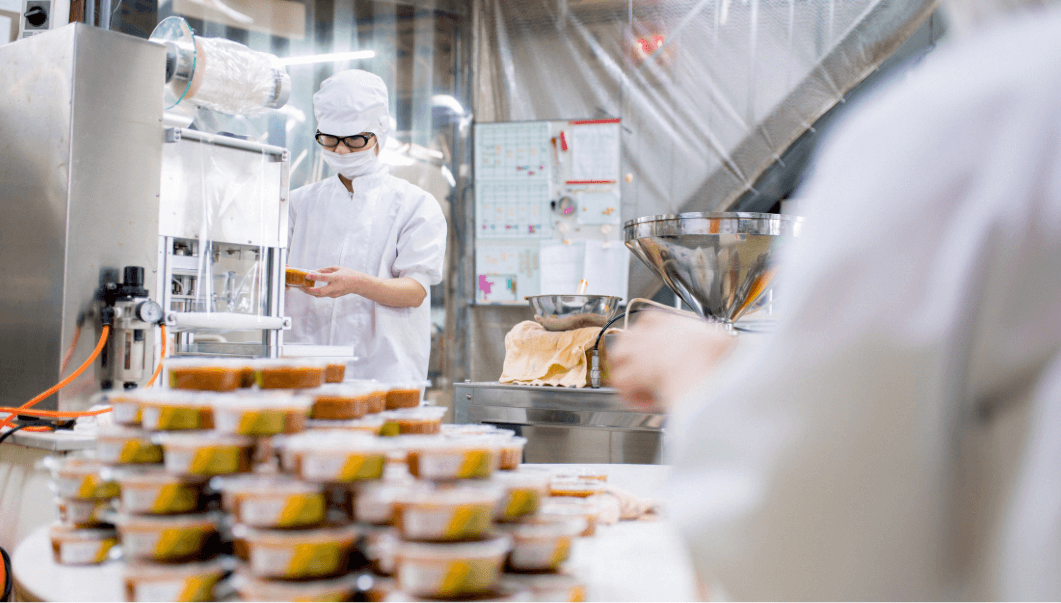
Efficient food production and its impact on wholesale prices
Efficient food production practices directly impact wholesale food prices.
By optimizing production processes, food factories can reduce labor, Asian, firm, energy, and raw materials costs.
This, in turn, helps lower wholesale prices, making food products more affordable and accessible to retailers and consumers.
Sustainable food factory practices, such as energy-efficient technologies and waste reduction measures, contribute to overall cost reduction and positively affect wholesale pricing.
Cost reduction through innovative food processing
Innovations in food processing have led to significant cost reductions in the food manufacturing industry.
Food factories now have access to advanced equipment and technologies that improve processing efficiency while maintaining product quality.
For example, automated slicing and packaging machines increase productivity and reduce labor costs.
These cost-saving measures translate into lower wholesale prices and benefit retailers and consumers.
The role of food factory design in lowering wholesale costs
Food factory design plays a crucial role in lowering wholesale costs.
Efficient layout and streamlined workflows minimize the time and resources required to produce high volumes of food products.
Proper zoning, equipment placement, and logistics optimization improve overall operational efficiency.
By investing in well-designed food factories, the industry can achieve significant cost savings and reduce wholesale food prices.
Food Delivery Revolution: Sustainability’s Role in the Popularity of Centralized Food Production
Centralized food production and its impact on delivery services
Centralized food production has played a pivotal role in the popularity of food delivery services.
By centralizing cooking and preparation, food factories can efficiently cater to the increasing demand for delivery orders.
This ensures faster turnaround times and consistent quality, enhancing customer satisfaction.
As discussed earlier, the sustainability aspect of centralized food production also aligns with the growing trend of environmentally friendly food choices.
Sustainable packaging solutions in the food delivery industry
The food delivery industry has witnessed a surge in sustainable packaging solutions.
With the rise in eco-conscious consumer behavior, food factories and delivery services invest in environmentally friendly packaging materials.
Biodegradable containers, food industry technology, wholesale food suppliers, compostable packaging, and recyclable materials are being used to minimize environmental impact.
The industry promotes responsible consumption and reduces waste generation by adopting sustainable packaging solutions.
Consumer demand for environmentally friendly food products
Consumers are increasingly demanding environmentally friendly food products.
This has prompted food factories to incorporate more sustainable practices and offer plant-based alternatives.
Food factories catering to these changing consumer preferences contribute to a more sustainable food system.
The shift towards environmentally friendly food products benefits the environment and improves public health and well-being.
Beyond the Factory Walls: Community Engagement and Sustainability Initiatives

Community outreach programs by food factories
Food factories actively engage with the community through various outreach programs.
These initiatives aim to educate the public about sustainable food practices, promote responsible consumption, and raise awareness about the importance of a sustainable food manufacturing industry.
By fostering stronger ties with the community, food factories strengthen their commitment to sustainability and encourage positive change.
Sustainability initiatives and partnerships in the food manufacturing industry
The food manufacturing industry in Singapore is committed to sustainability through various initiatives and partnerships.
Collaborations with government agencies centre, research institutions, and NGOs help drive innovation and promote sustainable practices across the industry.
These stakeholders can develop and implement solutions that address environmental challenges and create a more sustainable food manufacturing landscape by working together.
Engaging consumers in sustainable food consumption practices
Engaging consumers in sustainable food consumption practices is vital to creating a more sustainable food system.
Food factories actively educate consumers about the environmental benefits of their sustainable practices, promote responsible consumption habits, and encourage the purchase of sustainably produced food products.
Through consumer education and awareness campaigns, food factories inspire individuals to make more sustainable choices, positively impacting the environment.
Factory Equipment Reliability: Balancing Efficiency and Sustainability in Food Production
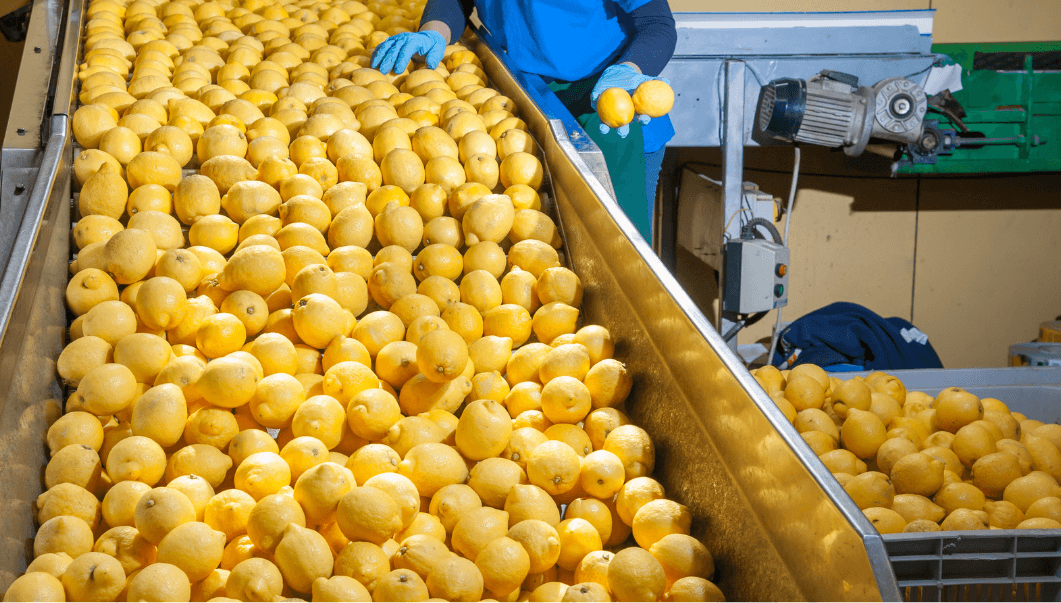
Ensuring reliable factory equipment performance
Factory equipment reliability is paramount for efficient food production.
Regular inspections and equipment maintenance are necessary to identify potential issues and prevent breakdowns that can disrupt the production process.
By conducting preventive care, factory managers can minimize unexpected equipment failures, factory outlet stores, and food delivery popularity, increase overall operational efficiency, and ensure a continuous supply of food products.
Implementing maintenance strategies to optimize efficiency
Factory operations management is critical in optimizing food factories’ efficiency.
Factory managers can streamline processes, improve production efficiency, and reduce costs by utilizing industry-leading food manufacturing standards.
This includes implementing automation systems, and you’ll find ensuring proper hygiene protocols and using advanced industrial kitchen equipment to enhance productivity and quality control.
Incorporating sustainable practices in equipment usage
As the demand for sustainable food production increases, food factories must prioritize environmentally friendly practices.
This includes minimizing waste generation, reducing water usage, and you’ll get implementing energy-efficient infrastructure.
Food factory managers can also explore using renewable energy sources, food industry automation, and food industry regulations, such as solar power, to reduce their carbon footprint further and contribute to a greener future.
Sustainable Food Manufacturing: Addressing Environmental Concerns While Meeting Demand
Reducing carbon footprint in the food manufacturing process
The food manufacturing industry is a significant contributor to greenhouse gas emissions.
You’ll be able to address this issue, and food factories can implement strategies to reduce their carbon footprint.
This can involve optimizing transportation logistics to minimize food miles, using energy-efficient machinery, and adopting sustainable packaging materials that are recyclable or biodegradable.
Implementing renewable energy sources in food factories
Integrating renewable energy sources, such as solar or wind power, into food factories can significantly reduce reliance on non-renewable resources and decrease greenhouse gas emissions.
By installing solar panels on factory rooftops or utilizing wind turbines, food factories can generate clean, sustainable energy to power their operations, ultimately reducing their environmental impact.
Minimizing water usage and waste generation
Water scarcity is a global concern, and food factories must prioritize water conservation.
Implementing water-efficient practices, such as recycling and reusing water, can significantly minimize water usage.
Additionally, food factories can implement waste management systems that reduce food factory sustainability, food factory waste reduction, reuse, and recycle waste materials to minimize their environmental footprint.
Singapore’s Sustainable Food Factories: A Look at JTC Food Zones’ Eco-Friendly Features
Introduction to JTC Food Zones and their sustainable initiatives
JTC Food Zones in Singapore are dedicated food production hubs prioritizing sustainability and efficiency.
These zones provide a conducive environment for food factories, offering modern infrastructure and sustainable initiatives to support eco-friendly practices in the food manufacturing industry.
Energy-efficient infrastructure and waste management systems
JTC Food Zones have energy-efficient infrastructure, including renewable energy sources and innovative grid systems.
These features enable food factories to reduce energy consumption and enhance overall operational efficiency, food factory equipment selection, and food factory expansion.
The zones also provide waste management systems that facilitate proper waste disposal and recycling, ensuring minimal environmental impact.
Supporting local agriculture and reducing food miles
JTC Food Zones promote the farm-to-table concept by supporting local agriculture and reducing food miles.
By providing space and facilities for urban farming, these zones allow food factories to source fresh produce locally, poultry, banana, and scallop, reducing the need for long-distance transportation and supporting sustainable farming practices.
Meeting Modern Consumer Trends: Sustainable Food Factories and Retail Strategies
Tailoring production to cater to consumer preferences
Consumer preferences continually evolve, and sustainable food factories must adapt to meet these changing demands.
By conducting market research and understanding consumer trends, food factories can tailor their production processes to create sustainable and healthier food options that align with modern consumers’ preferences. Factory Equipment Monitoring and Factory Equipment Safety Measures.
Utilizing technology to optimize food factory processes
Technology plays a vital role in optimizing food factory processes.
Technological innovations, from automated manufacturing systems to advanced data analytics, enable food factories to maximize efficiency, reduce waste, and ensure consistent product quality.
By embracing the latest advancements, sustainable food factories can stay competitive while minimizing environmental impact.
Collaborating with retailers to promote sustainable food choices
Collaboration between sustainable food factories and retailers is crucial to drive consumer awareness and promote sustainable food choices.
By partnering with retailers with the same sustainability goals, food factories can increase the availability of sustainable food products in the market, educate consumers about their environmental initiatives, and collectively work towards a more sustainable future.
Challenges and Opportunities: The Future of Sustainable Food Factories in Singapore
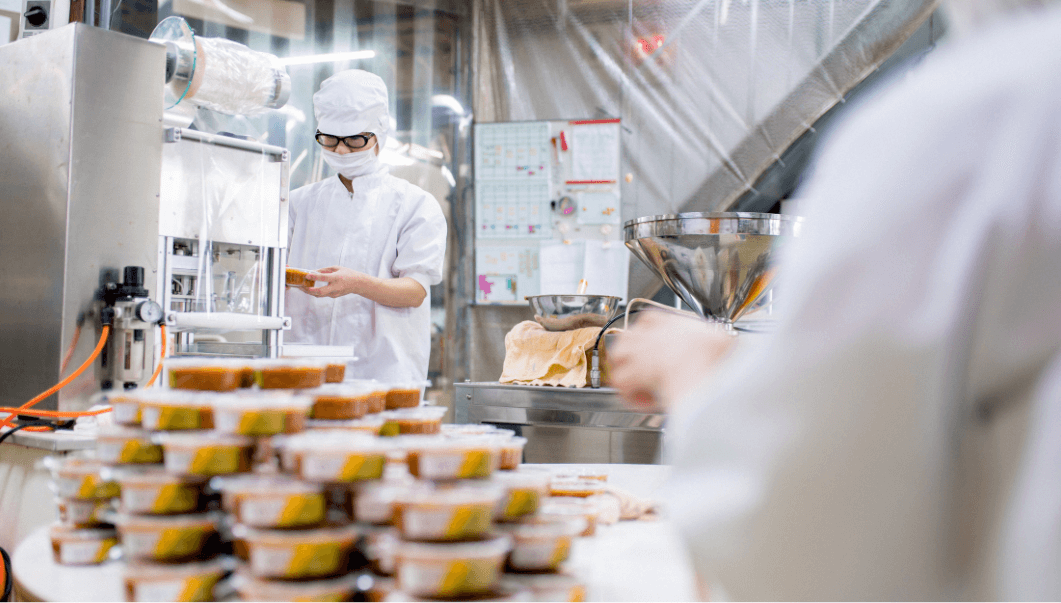
Overcoming barriers in scaling sustainable food production
Scaling sustainable food production poses various challenges, including technological limitations, high initial investments, and complex supply chain management.
Overcoming these barriers requires collaborations between industry stakeholders, government support, and continuous innovation to develop more sustainable practices and solutions for food factories.
Exploring potential advancements in food manufacturing technology
The future of sustainable food factories lies in technological advancements that can revolutionize the industry.
Continuous research and development can lead to more efficient, environmentally friendly, and sustainable food manufacturing processes, from precision farming techniques to advanced waste management systems.
Adapting to changing regulations and consumer expectations
Regulations regarding food safety, environmental sustainability, and labor practices can change over time.
Sustainable food factories must stay updated with these regulations and proactively adapt their practices to ensure compliance.
Additionally, understanding and meeting consumer expectations for sustainable and ethically produced food products will be crucial for the long-term success of sustainable food factories.
Conclusion
From traditional methods to cutting-edge sustainability, the evolution of food factories is reshaping the culinary landscape.
As sustainable practices take center stage, food factories lead the charge, redefining how we produce and consume.
Imagine a world where food production isn’t just about quantity but quality.
Sustainable food factories are making this vision a reality by championing practices that reduce environmental impact.
From responsibly sourced ingredients to waste management strategies, these factories are changing the game.
The technological wave is also playing a crucial role in this transformation.
Automation and robotics have stepped in, making production processes more innovative and efficient.
This means higher productivity and safer, f&b, top-notch products on our plates.
Frequently Asked Questions
What are Food Factories?
Food factories are industrial facilities where food products are processed, produced, and packaged for distribution.
What do Food Factories or Supermarkets sell?
Food factories sell various products, including chips, seafood, cakes, sashimi, brownie, sauces, pastries, snacks, and more.
Are Food Factories only responsible for the production of food?
No, food factories are responsible for various aspects, including food factory workforce management, cost-effective food production, food factory space automation benefits, food industry market trends, factory layout optimization, factory outlet, factory equipment maintenance, food production technology, waste management, sustainable practices, quality assurance, and risk management.
What are the benefits of factory automation in the food industry?
Factory automation in the food industry brings benefits such as increased efficiency, improved productivity, reduced labor costs, enhanced food safety, precise control over production processes, food trading, and faster time-to-market for food products.
How can food factory layout optimization improve operations?
Food factory layout optimization involves designing the factory floor, workflow, and equipment placement in a way that maximizes efficiency and minimizes waste, resulting in streamlined operations and greater productivity.
What is the importance of factory equipment maintenance in food production?
Factory equipment maintenance is crucial in food production to ensure the smooth functioning of machinery, minimize downtime, prevent breakdowns, and comply with hygiene and safety regulations.
What is food factory waste management?
Food factory waste management involves implementing strategies to reduce, recycle, and dispose of waste generated during food production, aiming for more sustainable and environmentally-friendly practices.
How can food factories practice sustainable food production?
Food factories can practice sustainable food production by implementing energy-efficient processes, reducing water usage, minimizing food waste, utilizing renewable resources, and adopting eco-friendly packaging materials.
What is quality assurance in food factories?
Quality assurance in food factories refers to the processes, procedures, and practices implemented to ensure that food products meet specified quality standards, including taste, safety, nutritional value, and labeling requirements.
How can food factories manage risks?
Food factories can manage risks by conducting thorough risk assessments, implementing proper food safety protocols, adhering to strict hygiene standards, monitoring and controlling critical control points, and having contingency plans.












